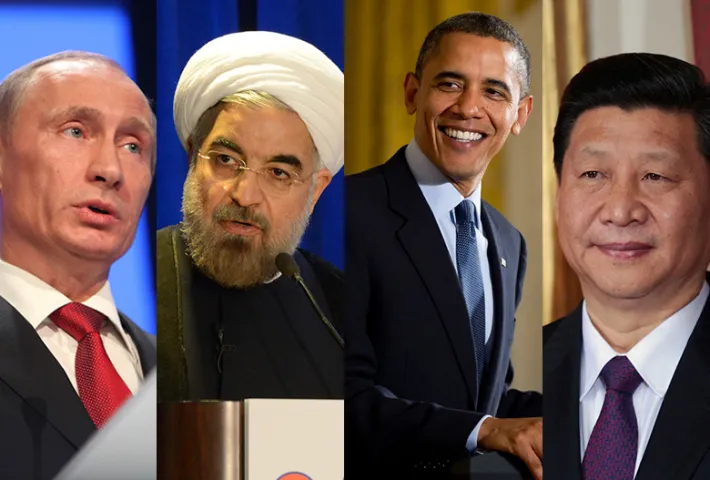
Perspectives September 30, 2015
Beware of Autocrats Seeking International Cooperation
At the United Nations, the presidents of Russia and China urged global unity against the common threats of terrorism and instability. What they are really pitching is an alliance of rulers against the ruled.

At the United Nations, the presidents of Russia and China urged global unity against the common threats of terrorism and instability. What they are really pitching is an alliance of rulers against the ruled.

Almost exactly 200 years ago, the absolute monarchs who had joined with Britain to defeat Napoleon Bonaparte formed a “holy alliance.” Through this and subsequent agreements during the postwar period, they sought to suppress the ideological and political threats that emerged from the French Revolution: liberalism, secularism, and nationalism.
Today, the rulers of Russia, China, and other authoritarian states would like to create a similar arrangement, uniting all incumbent governments against common threats to their grip on power. And like their predecessors, these dictators see little distinction among their diverse enemies. Independent journalists, liberal opposition parties, nonviolent minority advocates, and moderate Islamists are lumped together with militant jihadists and bloodthirsty radicals. All are seen as “extremists.”
Evidence for such views can be found throughout the speeches of Vladimir Putin and Xi Jinping at this week’s UN General Assembly debate.
First, they both invoked the origins of the United Nations in the victorious alliance of World War II, in which democracies fought alongside antidemocratic regimes like the Soviet Union to defeat the common threat of fascism.
Second, they expressed a readiness to contribute troops and money to a new global security effort. Xi announced new Chinese donations to the United Nations, pledged to “take the lead in setting up a permanent peacekeeping police squad and build a peacekeeping standby force of 8,000 troops,” and offered military aid to the African Union for its own standby force.
Putin alluded to Russia’s stepped-up support for the Syrian regime, and called on others to join him in an international coalition against terrorism: “Similar to the anti-Hitler coalition, it could unite a broad range of forces that are willing to resolutely resist those who just like the Nazis sow evil and hatred of humankind.”
Finally, they both used coded language to reject the universality of democratic principles and human rights, insisting instead on “diversity” and self-interested cooperation among incumbent powers. Thus Putin says, “We are all different. And we should respect that. No one has to conform to a single development model that someone has once and for all recognized as the only right one.”
Or as Xi puts it, “The principle of sovereignty not only means that the sovereignty and territorial integrity of all countries are inviolable and their internal affairs are not subject to interference. It also means that all countries’ right to independently choose social systems and development paths should be upheld.… Major countries should follow the principles of no conflict, no confrontation, mutual respect, and win-win cooperation in handling their relations.”
They seem to suggest that if democracies would simply give up the “export of revolutions,” in Putin’s words, everyone could get along and promote global peace and prosperity.
In fact, they are asking democratic powers to abandon dissidents to their fate, to ignore or even abet brutal repression, and to blindly accept the threats to stability posed by the dictatorships themselves. As Barack Obama rightly pointed out in his own UN speech, “catastrophes, like what we are seeing in Syria, do not take place in countries where there is genuine democracy and respect for the universal values this institution is supposed to defend.”
The international community should under no circumstances accept Xi and Putin’s proposal. Democracies cannot allow the United Nations to be converted into a mutual support society for endangered autocrats, shorn from its foundations in human rights and international law.
Even if it were morally acceptable, it would be doomed to failure. Today’s authoritarians will be no more successful in smothering the forces of change than were the archconservative monarchs of the 19th century. It is no accident that the turmoil of the early 20th century both emanated from and destroyed autocratic regimes, and it was with great wisdom that the founders of the United Nations coupled the goals of peace and security with “promoting and encouraging respect for human rights and for fundamental freedoms for all.”
